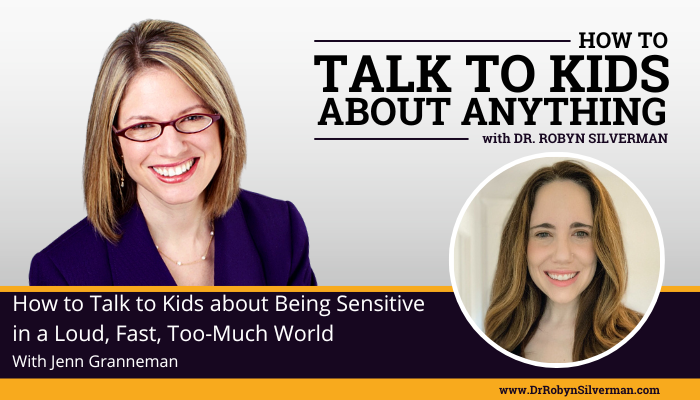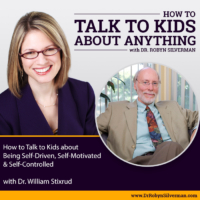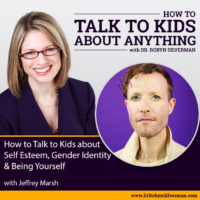Podcast: Play in new window | Download
Subscribe: Apple Podcasts | RSS | More
How to Talk to Kids about Being Sensitive in a Loud, Fast, Too-Much World

This podcast will focus on how we can support our highly sensitive children in a world that is often loud, fast and overwhelming for them. Dr. Robyn Silverman interviews Jenn Granneman of Introvert, Dear.
Guest Expert: Jenn Granneman
Do you have a sensitive child? Or, perhaps you are the sensitive one having been told your whole life, “you’re too sensitive!” “shake it off!” or “you’ve got to toughen up!” Well, no more. Did you know that nearly 1 in 3 people are highly sensitive individuals? And while sensitivity has its challenges at times—it also provides some beautiful gifts. How do we talk to and support our sensitive kids? And if we are the ones who are sensitive, how do we raise a child in a loud, often overstimulating world? For this, we turn to our next guest, Jenn Granneman.
Jenn Granneman is the founder of the world’s largest online community for introverts, IntrovertDear. An educator, journalist, and the author of The Secret Lives of Introverts, she has been featured in HuffPost, the Washington Post, the BBC, Oprah Daily, Buzzfeed, Glamour, and more, as well as numerous podcasts. She has a new book out called Sensitive: The Hidden Power of the Highly Sensitive Person in a Loud, Fast, Too-Much World
Important Messages:
- You can be an extroverted, sensitive person, and research shows that about 30% of sensitive people are extroverted. So that leaves 70% being introverted. There’s a lot of overlap between introversion and sensitivity. There are differences, there are similarities.
- If you’re a sensitive person, everything you experience affects you more, but you do more with it. So you’re more in tune with your environment. You’re more in tune with people. Sensitive people are actually very specifically wired in their brains to be very in tune with other people, those social and emotional cues. So a sensitive person might be the one who notices that there’s a hint of blue in the gray color on the wall, or the sensitive person might be the one who hears that ticking of the clock that no one can hear, and that ticking drives them crazy like it would for me. But sensitive people are also the ones who notice just a, a quick flash of an expression on someone’s face before it disappears. They might notice what someone else seems to be feeling or what they seem to be needing. So sensitive people are really perceptive to everything going on around them, which is an amazing superpower. But as you can guess, it creates challenges.
- Sensitive people are really perceptive to everything going on around them, which is an amazing superpower. But as you can guess, it creates challenges too.
- Sensitive people tend to be our best human body language decoders.
- You might be a sensitive person, if you’ve ever had the experience of maybe your spouse or your kid coming home after a tough day at work or school, and they don’t say anything to you, but you can just tell by looking at them that something happened.
- When you’re sensitive, everything affects you more, but you do more with it. So when everything affects you more, that means the stress, the anxiety, the hardship, the struggle of life. Those things can affect you more. You can hurt more from them. Get drained more too.
- You can embrace your sensitivity while also stepping out of your comfort zone. They do need to learn how to be in an environment that might be taxing on their system, but they also need to learn that it’s okay to say no to those things. They also need to learn that it’s okay that they have the reactions that they have and the feelings that they have. And then they need to learn that it’s okay to have that downtime that they need afterward to recover from that event.
- Someone who is sensitive can have sensory intelligence, depth of processing, depth of emotion, creativity and empathy, and, which was certainly being able to pick up on other people’s feelings is, is a wonderful skill.
- First step is to embrace that sensitivity. We need to teach our kids that it’s okay to be sensitive. It’s a superpower. It’s something that can give them a huge advantage in life if they embrace it. And then we need to, to teach them how to deal with those challenges, or what we like to call the cost of sensitivity in our book. And that includes that overstimulation that they might feel in a loud environment or just that tiredness that they feel after a busy day. You know, there, there are a lot of kids that come home after school and they just want to sit and relax because just the day alone was draining for them. If they were, if they’re a sensitive person, that was certainly me when I was a kid. I had to go and close my bedroom door and just relax and recover for a bit.
- Moving from empathy to compassion, which is a more positive, proactive emotion that is still beautiful and helpful. It’s actually more helpful to the people around you, because when we’re taking on everybody’s burdens through empathy, while we’re feeling sad too, and we might not be in a place that we can actually help or make a difference for the other person, but compassion says, I’m here for you. Let’s make it about you, not me.
- Don’t say, “calm down” or “shake it off” or “you’re too sensitive.”
- Don’t tell them to calm down in that moment, but help them to calm down.
(1) Accept and embrace the sensitivity. (2) Help them understand the way they were wired. Help them understand it’s okay if they feel tired or drained or overwhelmed at a loud birthday party. Maybe they feel a little anxious going in because they don’t know what’s going to happen. And that can be, that can be a big anxiety trigger for sensitive people just not knowing what’s going to happen. (3) Create a situation where it’s easy for them to leave if they need to—like a signal. Or plan on the hour. (4) Make a plan. You might say, “we’re going to a party at so-and-so’s house. If you start to get overstimulated, you know, if you’re feeling like overwhelmed, you can always go into Charlotte’s room. Yes. and they, you know, they said that’s completely fine to just get away from the noise for a while. If you wanna play with the figurines or whatever that you like to in Charlotte’s room, you know, something like that might be, if you already know the place and the other parent, it might be a way to, to ease that because they have their escape already planned. - Help them to see when they are going to reach that point of overstimulation before they reach it and go tumbling over the edge of it. when they’re older too, it’s important to notice and help your child become aware of that when they’re just standing on the edge of overstimulation so that they can stop and step back and take a break before it gets to be too much.
- Powerful questions: Where are you feeling it? Is your heart starting to be, you know, heavy? Are your hands starting to sweat? Are you feeling something in your face? Are you feeling your, your mouth clench? What is happening right then? So that once they notice the signs within their own body, they may know, oh, this might be that time to take that walk. Would that help? That type of situation?
- Janine Halleran. She does a lot of coping mechanisms with kids for things like when you’re stressed what to do and talks about a bunch of different ways that you might do this with a child. And it all, it will be different for each child, whether it’s their way of coping is physical pounding on Play-Doh, you know, pounding on a drum, running, doing jumping jacks, that kind of thing might be very sensory oriented where you’re swaddling yourself with a blanket and you’re listening to music. There might be specific calming techniques like deep breaths, meditation thinking about your favorite place. So I would imagine that it would be helpful for the parent and the child to kind of figure out what would work for that child. What do you want here in this sanctuary? Like if you want your cuddly teddy bear or your, or your blanket, you know, what makes you feel safe and really good and calm? What makes you feel more calm and less overstimulated? So would you agree that that how we approach it may depend on what really works for our child and that’s what would go in that sanctuary?
- So what are some phrases that we can teach our child to say when they need to set a boundary? I need to take a break. I need to go to the bathroom. I’m gonna go take a walk. Communicates to the people around you that you just need a break. I just need to go alone. I just need to go take the break alone. I’m not mad. I just need a break. I’ll be back in 10 minutes or what, you know, however long you might be back in.
- Don’t want to go somewhere with a friend: I can’t do that, or that just doesn’t work for me, or that’s not okay with me. You can also just say no and leave it at that.
- Five your children an out—Blame me! Parents can say “blame me” to the kids.
- So how do we talk to our own kid about how to, about their sensitivity in general? First thing is to talk about sensitivity in a positive way. Right. I think a lot of sensitive people do feel like something is wrong with them. Talk about it as a strength and advantage, a superpower so that kids stop feeling shame about it. And I think once you stop feeling that shame, it’s a lot easier then to understand. Well, my brain, it, it processes things very deeply.
- Top tip: Start seeing sensitivity as a strength, not a weakness. And I think when you do that, when you see your child’s sensitivity as something wonderful and beautiful and awesome about them, then I think the rest will follow.
Notable Quotables:
- “I grew up as a sensitive person…I heard all those things. ‘You are too sensitive,’ ‘you are overreacting,’ ‘you care too much.’ I mean, how can you say that you care too much?”
- “Sensitive people are really perceptive to everything going on around them, which is an amazing superpower. But as you can guess, it creates challenges too.”
- “Sensitive people tend to be our best human body language decoders.”
- “You can embrace your sensitivity while also stepping out of your comfort zone.”
- “We want to move from empathy to compassion, which is a more positive, proactive emotion that is still beautiful and helpful. It’s actually more helpful to the people around you, because when we’re taking on everybody’s burdens through empathy, while we’re feeling sad too, and we might not be in a place that we can actually help or make a difference for the other person, but compassion says, I’m here for you. Let’s make it about you, not me.”
- “Don’t tell them to calm down in that moment, but help them to calm down.”
- “Let’s start seeing sensitivity as a strength, not a weakness. When you see your child’s sensitivity as something wonderful and beautiful and awesome, then the rest will follow.”
Let’s start seeing sensitivity as a strength, not a weakness, says @JennGranneman of @introvertdear. We talk all about how sensitivity is a superpower (although it has its challenges) on the latest #talktokids podcast episode!
Click To Tweet
Resources:
- Book: Sensitive: The Hidden Power of the Highly Sensitive Person in a Loud, Fast, Too-Much World
- https://introvertdear.com/
The post How to Talk to Kids about Being Sensitive in a Loud, Fast, Too-Much World with Jenn Granneman appeared first on drrobynsilverman.com.








